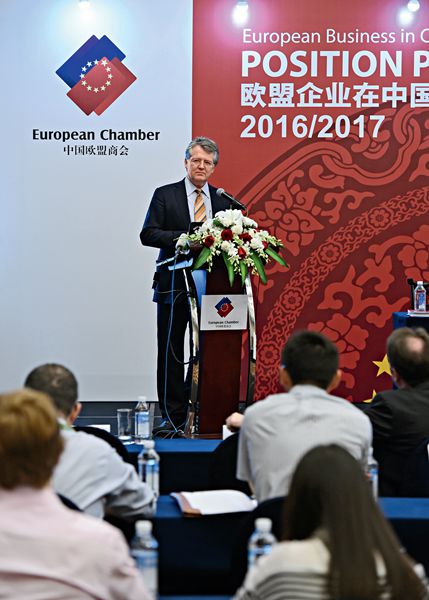Economic Ties Stabilize China-EU Relations
China Today by LI GANG, January 22, 2017 Adjust font size:

The European Chamber of Commerce in China released the European Business in China Position Paper 2016/2017 in Beijing on September 1, 2016.
On April 19, 2016, Bank of China officially opened its new branch in Stuttgart, its sixth branch in Germany after having already established branches in Frankfurt, Hamburg, Düsseldorf, Berlin, and Munich. Bank of China now covers all major German cities, forming a nationwide network to facilitate investment and financing for Chinese enterprises operating locally. Stuttgart is the capital of Baden-Württemberg which boasts a well-developed economy with strong industry and high-tech development. World-famous companies like Daimler-Benz are situated there. Bank of China’s Stuttgart branch can also facilitate German companies’ investment in China and create more opportunities for bilateral trade and financial cooperation.
Creating More Opportunities
An investment agreement between China and the EU should be drawn up as soon as possible together with feasibility studies on a China-EU Free Trade Agreement. The increase in economic and trade cooperation will no doubt create friction, so it will be necessary to work through any possible disputes with dialogue and consultation in order to ensure that the remedies are mutually beneficial. China and Europe have a common interest in the development of infrastructure, upgrades in industry, scientific innovation, the development of green energy and urbanization. Huge potential exists for investment in these areas. A China-EU Investment Agreement encompassing investment protection, market threshold, and investment environment will provide an institutional guarantee to both Chinese and European companies.
Strengthening cooperation in science and technology will not only assist China’s efforts to upgrade its national industry but also invigorate economic growth in Europe. The EU has adopted several regulations regarding high-tech exports to China, which have been a setback for bilateral high-tech trade. If the EU could lower export restrictions on the new energy, new materials, and environmentally-friendly means of production that are desperately needed in China, European technology could reach a vast market which would assist in upgrading the current industrial structure and transform the model of economic development in China, while also injecting the European economy with new impetus in this post-crisis era.
Improving financial and monetary cooperation will maintain the stability of the euro and accelerate the internationalization of the RMB. European countries have been weathering the storm of the debt crisis while trying to facilitate the integration of EU nations. To help Europe at this difficult time, China unswervingly supported the euro and assisted integration in Europe through the acquisition of bonds and increasing imports. In return, the strong infrastructure of the European financial centers facilitate the internationalization of the RMB and European nations can use the RMB to make a global impact.
People-to-people exchanges are at the heart of the link between China and Europe, and guarantee the sustainable development of sound economic and trade relations. China and Europe have diverse values and ideologies; misunderstandings and prejudice easily occur. Only through mutual understanding can two strangers become real friends. People-to-people ties play an important role in promoting understanding. Since the signing of a joint declaration at the first China-EU High Level People-to-People Dialogue in April 2012, some positive outcomes have already emerged. At present there are six million personnel exchanges between China and Europe annually – with 16,000 people travelling every day. According to statistics from the China National Tourism Administration, 2,984,100 European tourists travelled to China in 2015 and the number of Chinese citizens choosing Europe as their top travel destination increased to 3,427,600. In the last decade, over 30,000 students and researchers from China and the EU have studied abroad or had scholarly exchanges with universities or institutes sponsored by mutual scholarship.
China and EU should also focus on strengthening cooperation in global economic governance. Both active advocators of global economic governance reform, China and the EU share much common ground. The two sides should advance the process of institutionalizing the G20, making it the fundamental platform for global economic governance. They should also advance international financial institutional reform, increase the diversity of the monetary system and overturn the continued dominance of the US dollar, so as to create a fairer international monetary system that will help develop a stable global economy. China and the EU are major players in the global trading system. Strengthening cooperation in the formation of global trade rules and rejecting trade protectionism in any form is their mutual responsibility.
DR. LI GANG is an assistant research fellow with the Institute of European Studies at the Chinese Academy of Social Sciences.
